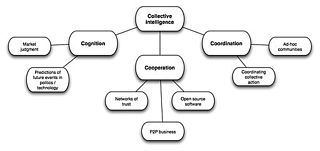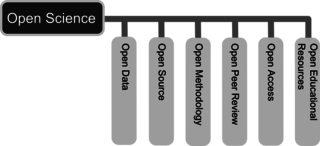Academic publishing is the subfield of publishing which distributes academic research and scholarship. Most academic work is published in academic journal article, book or thesis form. The part of academic written output that is not formally published but merely printed up or posted on the Internet is often called "grey literature". Most scientific and scholarly journals, and many academic and scholarly books, though not all, are based on some form of peer review or editorial refereeing to qualify texts for publication. Peer review quality and selectivity standards vary greatly from journal to journal, publisher to publisher, and field to field.

An academic or scholarly journal is a periodical publication in which scholarship relating to a particular academic discipline is published. Academic journals serve as permanent and transparent forums for the presentation, scrutiny, and discussion of research. They are usually peer-reviewed or refereed. Content typically takes the form of articles presenting original research, review articles, and book reviews. The purpose of an academic journal, according to Henry Oldenburg, is to give researchers a venue to "impart their knowledge to one another, and contribute what they can to the Grand design of improving natural knowledge, and perfecting all Philosophical Arts, and Sciences."

Geoffrey Everest Hinton is an English Canadian cognitive psychologist and computer scientist, most noted for his work on artificial neural networks. Since 2013 he divides his time working for Google and the University of Toronto.
Collaborative intelligence characterizes multi-agent, distributed systems where each agent, human, or machine is uniquely positioned with autonomy to contribute to a problem-solving network. Collaborative autonomy of organisms in their ecosystems makes evolution possible. Natural ecosystems, where each organism's unique signature is derived from its genetics, circumstances, behavior and position in its ecosystem, offer principles for design of next generation social networks to support collaborative intelligence, crowd-sourcing individual expertise, preferences, and unique contributions in a problem-solving process.
Nature Research is a division of the international scientific publishing company Springer Nature that publishes academic journals, magazines, online databases, and services in science and medicine. Nature Research's flagship publication is Nature, a weekly multidisciplinary journal first published in 1869. It also publishes the Nature-titled research journals, Nature Reviews journals, society-owned academic journals, and a range of open access journals, including Scientific Reports and Nature Communications. Springer Nature also publishes Scientific American in 16 languages, a magazine intended for the general public. In 2013, prior to the merger with Springer and the creation of Springer Nature, Nature Publishing Group's owner, Holtzbrinck Publishing Group, bought a controlling stake in Frontiers.

Open research is research conducted in the spirit of free and open-source software. Much like open-source schemes that are built around a source code that is made public, the central theme of open research is to make clear accounts of the methodology freely available via the internet, along with any data or results extracted or derived from them. This permits a massively distributed collaboration, and one in which anyone may participate at any level of the project.
Grey literature are materials and research produced by organizations outside of the traditional commercial or academic publishing and distribution channels. Common grey literature publication types include reports, working papers, government documents, white papers and evaluations. Organizations that produce grey literature include government departments and agencies, civil society or non-governmental organisations, academic centres and departments, and private companies and consultants.

Pierre Lévy is a French philosopher, cultural theorist and media scholar who specializes in the understanding of the cultural and cognitive implications of digital technologies and the phenomenon of human collective intelligence.
Collective wisdom, also called group wisdom and co-intelligence, is shared knowledge arrived at by individuals and groups.
Content creation is the contribution of information to any media and most especially to digital media for an end-user/audience in specific contexts. Content is "something that is to be expressed through some medium, as speech, writing or any of various arts" for self-expression, distribution, marketing and/or publication. Typical forms of content creation include maintaining and updating web sites, blogging, photography, videography, online commentary, the maintenance of social media accounts, and editing and distribution of digital media. A Pew survey described content creation as the creation of "the material people contribute to the online world."

Collective intelligence (CI) is shared or group intelligence that emerges from the collaboration, collective efforts, and competition of many individuals and appears in consensus decision making. The term appears in sociobiology, political science and in context of mass peer review and crowdsourcing applications. It may involve consensus, social capital and formalisms such as voting systems, social media and other means of quantifying mass activity. Collective IQ is a measure of collective intelligence, although it is often used interchangeably with the term collective intelligence. Collective intelligence has also been attributed to bacteria and animals.
Science 2.0 is a suggested new approach to science that uses information-sharing and collaboration made possible by network technologies. It is similar to the open research and open science movements and is inspired by Web 2.0 technologies. Science 2.0 stresses the benefits of increased collaboration between scientists. Science 2.0 uses collaborative tools like wikis, blogs and video journals to share findings, raw data and "nascent theories" online. Science 2.0 benefits from openness and sharing, regarding papers and research ideas and partial solutions.

Zooniverse is a citizen science web portal owned and operated by the Citizen Science Alliance. It is home to some of the internet's largest, most popular and most successful citizen science projects. The organization grew from the original Galaxy Zoo project and now hosts dozens of projects which allow volunteers to participate in crowdsourced scientific research. It has headquarters at Oxford University and the Adler Planetarium. Unlike many early internet-based citizen science projects which used spare computer processing power to analyse data, known as volunteer computing, Zooniverse projects require the active participation of human volunteers to complete research tasks. Projects have been drawn from disciplines including astronomy, ecology, cell biology, humanities, and climate science.
The Center for Digital Research and Scholarship (CDRS) at Columbia University partners with researchers and scholars at Columbia to share their research broadly with the world. Using innovative new media and digital technologies, CDRS empowers the Columbia research community with online tools and services to enable them to make the most of scholarly communication, collaboration, data sharing, and preservation. CDRS is part of Columbia University Libraries/Information Services (CUL/IS).

Kune is a free/open source distributed social network focused on collaboration rather than just on communication. That is, it focuses on online real-time collaborative editing, decentralized social networking and web publishing, while focusing on workgroups rather than just on individuals. It aims to allow for the creation of online spaces for collaborative work where organizations and individuals can build projects online, coordinate common agendas, set up virtual meetings, publish on the web, and join organizations with similar interests. It has a special focus on Free Culture and social movements needs. Kune is a project of the Comunes Collective.
Virtual collective consciousness (VCC) is a term rebooted and promoted by two behavioral scientists, Yousri Marzouki and Olivier Oullier in their 2012 Huffington Post article titled: “Revolutionizing Revolutions: Virtual Collective Consciousness and the Arab Spring”, after its first appearance in 1999-2000. VCC is now defined as an internal knowledge catalyzed by social media platforms and shared by a plurality of individuals driven by the spontaneity, the homogeneity, and the synchronicity of their online actions. VCC occurs when a large group of persons, brought together by a social media platform think and act with one mind and share collective emotions. Thus, they are able to coordinate their efforts efficiently, and could rapidly spread their word to a worldwide audience. When interviewed about the concept of VCC that appeared in the book - Hyperconnectivity and the Future of Internet Communication - he edited, Professor of Pervasive Computing, Adrian David Cheok mentioned the following: "The idea of a global (collective) virtual consciousness is a bottom-up process and a rather emergent property resulting from a momentum of complex interactions taking place in social networks. This kind of collective behaviour results from a collision between a physical world and a virtual world and can have a real impact in our life by driving collective action."

iSpot is a website developed and hosted by the Open University with funding from the Open Air Laboratories (OPAL) network with an online community intended to connect nature enthusiasts of all levels.













